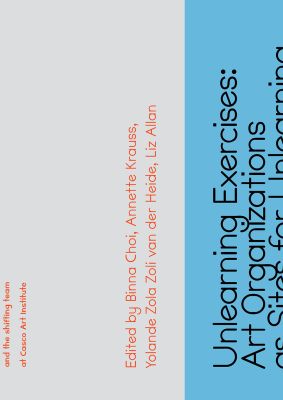Learning is often progress-oriented, institutionally driven, and focused on the accumulation of knowledge, skills, and behaviour. In contrast, unlearning is directed towards embodied forms of knowledge and the (un)-conscious operation of ways of thinking and doing. Unlearning denotes an active critical investigation of normative structures and practices in order to become aware and get rid of taken-for-granted truths of theory and practice. This book shares the process of unlearning, taking art and art institutions as sites for unlearning and Casco Art Institute: Working for the Commons as an experimental case. Unlearning at an art organisation has led to collective unlearning exercises that express the conditions, modalities, and implications of a particular group of art workers. The business of running an art institution is irrevocably tied up with the anxiety and stress of constantly being busy making things visible in competitive and hierarchical conditions. This busyness causes the habitual undervaluing of what often remains invisible so-called reproductive works such as cleaning, fixing, and caring. Unlearning processes make way for social transformations that lead towards the culture of equality and difference which we call the culture of the commons. Unlearning Exercises: Art Organisations as Sites for Unlearning shares a set of unlearning exercises as propositions to be useful for and adapted within other specific (institutional) contexts in and beyond the arts. These exercises range from daily practices like Cleaning Together, to seemingly unresolvable issues of collective authorship and fair wage. They also offer insights into the lively and long-term collective unlearning process. The exercises are accompanied by personal accounts, essays, political criticism, and collective conversations, forming a multi-faceted critique of institutionalised habits while studying and practicing processes of unlearning.

